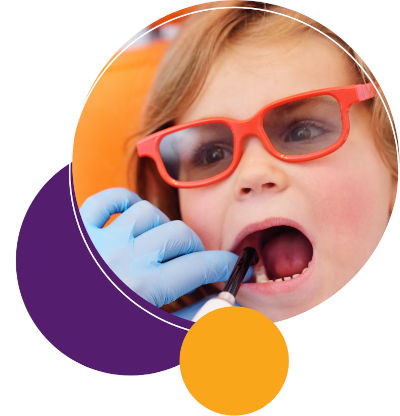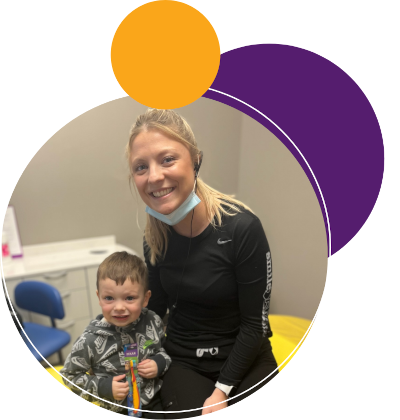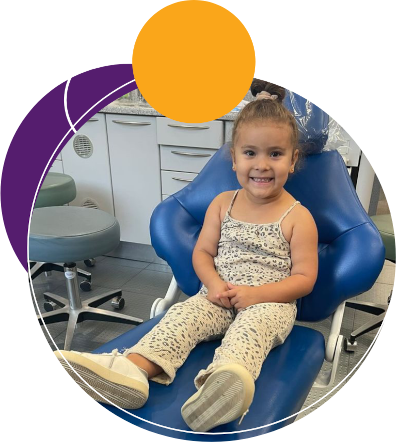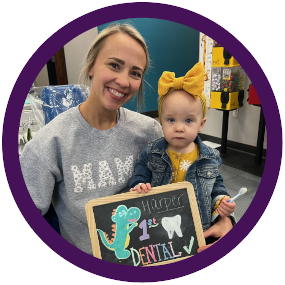Preventing Baby Bottle Tooth Decay in Wichita & Derby KS



At ICTeeth Pediatric Dentistry, our mission is to give every child the healthiest start possible. One of the biggest concerns for parents is preventing early childhood cavities, especially a condition known as baby bottle tooth decay. Even though baby teeth are temporary, they play a critical role in your child’s oral development. Protecting these first teeth helps your child eat comfortably, speak clearly, and develop good habits that last a lifetime.
Preventing tooth decay is a lifelong process that begins as soon as the first baby teeth erupt. Because baby teeth are more delicate than permanent teeth, they are highly vulnerable to cavities caused by sugar and bacteria. The good news is that with the right care, baby bottle tooth decay can be prevented.
Why Choose Us
- We have four talented pediatric dentists
- We have an amazing team who love small faces and big smiles
- Parents love the fun and positive experience for their kids

What is Tooth Decay?
Tooth decay, often referred to as cavities, is the breakdown of the tooth’s outer layer (enamel). This process occurs when bacteria in the mouth feed on sugars, producing acids that erode the enamel. Over time, these acids create small holes that grow larger if left untreated.
Cavities can be painful and may cause sensitivity, swelling, or infections. Many parents mistakenly believe that cavities in baby teeth do not matter because those teeth will eventually fall out. However, untreated decay can lead to serious complications such as:
- Pain that affects eating, sleeping, and behavior
- Infections that may spread beyond the tooth
- Premature tooth loss which can affect speech and bite alignment
- Damage to developing permanent teeth beneath the gums
At ICTeeth Pediatric Dentistry, we stress the importance of caring for baby teeth as diligently as permanent ones. Early intervention prevents bigger dental problems later.
Read Our
Reviews
The Four Stages of Tooth Decay
Tooth decay progresses in stages. Understanding these helps parents see why early treatment and prevention are critical.
- Demineralization: The earliest stage begins when acids weaken the enamel, creating white spots on the teeth. At this stage, fluoride and improved oral hygiene may reverse the damage.
- Cavity Formation: As enamel continues to break down, a cavity develops. This allows bacteria and food particles to collect inside the hole, worsening the decay.
- Pulp Damage: If bacteria reach the inner pulp (where nerves and blood vessels are located), the tooth becomes painful and may require a baby root canal or extraction.
- Tooth Loss: When decay is too advanced to repair, the tooth may need to be removed to prevent infection from spreading.
Because primary teeth are smaller and thinner, cavities progress much faster than in adult teeth. That is why our pediatric dentists recommend early dental visits and preventive care.


Dr. Stephen P. Moore

Dr. David J. Brown

Dr. Trey K. Anderson

Dr. Amrita Khemka

Dr. Kristal Raya

Dr. Kelsey Martinez

-Deana R.
How to Prevent Baby Bottle Tooth Decay
The good news is that baby bottle tooth decay is almost always preventable. Here are practical strategies recommended by our pediatric dentists:
1. Avoid Bottles at Bedtime
Do not put your child to bed with a bottle filled with milk, juice, or sweetened liquid. If your baby needs comfort, offer water instead.
2. Clean Gums and Teeth Early
Even before teeth appear, wipe your baby’s gums with a clean, damp washcloth after each feeding. Once teeth erupt, brush gently with a soft-bristled infant toothbrush and a smear of fluoride toothpaste.
3. Limit Sugary Drinks
Juice and soda are not necessary for babies and toddlers. If you allow juice, dilute it with water and limit it to mealtimes. Water and milk are the best daily choices.
4. Introduce Fluoride Early
Fluoride helps strengthen enamel and prevent cavities. Give your child fluoridated tap water starting at six months, and use fluoride toothpaste as recommended.
5. Avoid Sugary Pacifiers
Never dip pacifiers in sugar, honey, or syrup. These practices expose teeth to sugars that promote rapid decay.
6. Establish a Dental Routine
Begin brushing twice daily as soon as the first tooth appears. Around age 2, teach your child to spit after brushing. Floss between teeth that touch as your child gets older.
7. Schedule Early Dental Visits
The American Academy of Pediatric Dentistry recommends a child’s first dental visit by age one or within six months of the first tooth erupting. Regular visits help detect problems early and give parents personalized guidance.

The Role of Pediatric Dentists in Wichita & Derby
Our pediatric dental teams at ICTeeth in Wichita and Smile Safari in Derby specialize in children’s oral health. We create a welcoming, fun environment that helps kids feel comfortable. During preventive visits, we:
- Examine your child’s teeth and gums for early signs of decay
- Provide professional cleanings to remove plaque and tartar
- Apply fluoride treatments to strengthen enamel
- Place dental sealants on back teeth to prevent cavities
- Educate parents on diet, brushing, and oral care routines
We believe prevention is the best treatment. By starting early, we can help children avoid painful dental issues and costly treatments later.
Long-Term Benefits of Preventing Baby Bottle Decay
When you prioritize your child’s oral health, you are setting them up for a lifetime of positive outcomes. Benefits include:
- Reduced risk of cavities in both baby and permanent teeth
- Healthier gums and stronger enamel
- Less need for dental procedures such as fillings, crowns, or extractions
- Improved self-esteem from a healthy smile
- Lower risk of speech delays or difficulties caused by missing teeth
- Better nutrition since strong teeth make eating easier
Prevention is not just about saving teeth. It is about promoting overall health, confidence, and well-being.
Protect Your Child’s Smile in Wichita & Derby, KS
Every child deserves a healthy, happy smile. At ICTeeth Pediatric Dentistry in Wichita and Smile Safari Pediatric Dentistry in Derby, we are passionate about helping families prevent baby bottle tooth decay and build strong oral health habits from the very beginning.
If you are concerned about your baby’s teeth or want to learn more about preventive care, schedule a visit with our compassionate pediatric dentists today. Whether you are in Wichita or Derby, we are here to provide gentle, expert care for your little one.
Call our offices or request an appointment online today. Together, let’s protect your child’s smile for years to come.





